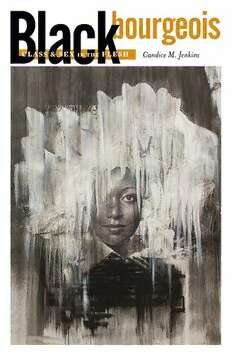
Black Bourgeois: Class and Sex in the Flesh PDF
Preview Black Bourgeois: Class and Sex in the Flesh
Black Bourgeois This page intentionally left blank Black Bourgeois CLASS AND SEX IN THE FLESH Candice M. Jenkins University of Minnesota Press Minneapolis London Excerpts from Citizen: An American Lyric, copyright 2014 by Claudia Rankine, are reprinted with the permission of The Permissions Company, Inc., on behalf of Graywolf Press, www.graywolfpress.org. Reproduced by permission of Penguin Books Ltd. Chapter 1 was previously published as “New Bourgeoisie, Old Bodies: Perform- ing Post– Civil Rights Black Privilege in Tar Baby and School Daze,” Criticism 58, no. 4; copyright 2016 Wayne State University Press; reprinted with permission of Wayne State University Press. Portions of chapter 3 were previously published in a different form in “‘A Kind of End to Blackness’: Reginald McKnight’s He Sleeps and the Body Politics of Race and Class,” in From Bourgeois to Boojie: Black Middle Class Performances, ed. Vershawn Ashanti Young and Bridget Tsemo; copyright 2011 Wayne State University Press; reprinted with permission of Wayne State Uni- versity Press. Copyright 2019 by the Regents of the University of Minnesota All rights reserved. No part of this publication may be reproduced, stored in a retrieval system, or transmitted, in any form or by any means, electronic, mechan- ical, photocopying, recording, or otherwise, without the prior written permission of the publisher. Published by the University of Minnesota Press 111 Third Avenue South, Suite 290 Minneapolis, MN 55401- 2520 http://www.upress.umn.edu Printed in the United States of America on acid- free paper The University of Minnesota is an equal- opportunity educator and employer. Library of Congress Cataloging-in-Publication Data Names: Jenkins, Candice Marie, author. Title: Black bourgeois : class and sex in the flesh / Candice M. Jenkins. Description: Minneapolis : University of Minnesota Press, [2019] | Includes bibliographical references and index. Identifiers: LCCN 2018055521| ISBN 978-1-5179-0579-8 (hc) | ISBN 978-1-5179-0580-4 (pb) Subjects: LCSH: American literature—20th century—History and criticism. | American literature—African American authors—History and criticism. | American literature—21st century—History and criticism. | African Americans in literature. | Class consciousness in literature. | Social classes in literature. | Human body in literature. Classification: LCC PS228.S63 J46 2019 | DDC 810.9/896073—dc23 LC record available at https://lccn.loc.gov/2018055521 UMP BmB 2019 Race is the modality in which class is lived. — Stuart Hall, Chas Critcher, Tony Jefferson, John Clarke, and Brian Roberts, Policing the Crisis: Mugging, the State, and Law and Order This page intentionally left blank Contents Preface ix Introduction: The Black and Bourgeois Dilemma 1 1 New Bourgeoisie, Old Bodies: Performing Post– Civil Rights Black Privilege in Tar Baby and School Daze 37 2 “Half of Everything and Certain of Nothing”: Cultural Mulattoes and Racial Property in Black, White, and Jewish and Caucasia 61 3 Mapping Class: He Sleeps, Black Girl in Paris, and the Gendered Geography of Black Labor 93 4 Interiority, Anteriority, and the Art of Blackness: Erasure and the Post- racial Future 131 5 Flesh, Agency, Possibility: Social Death and the Limits of Progress in John Henry Days and Man Gone Down 157 Conclusion: Black and Bourgeois in the Era of #BlackLivesMatter 201 Acknowledgments 221 Notes 225 Index 259 This page intentionally left blank Preface This anxiety about propriety and place, race and class, marks me as hopelessly bourgeois, I suppose. — Patricia J. Williams, Open House Class is a weird, weird thing for black Americans. Maybe I should only speak for myself, though recently published essays about what might be summed up as class ambivalence, one in as storied a venue as the New York Times, suggest black people’s strange feelings about class, and espe- cially class privilege, run wide and deep.1 Among those of us— especially those of us grown folks— who can presently be counted as middle class, very few have lived inside that location in an uncomplicated, comfortable way since birth, and even fewer can point to a long legacy of ancestors so positioned. Instead, in each generation some of us, via education, as- piration, hard work (our own, and our parents’) and luck, find ourselves much more comfortable than our parents were— and some of those who started out in relative stability fall out of their family’s class position, at rates much higher than for white Americans.2 For many of us, middle- class status is neither a given nor a permanent status, and it is only rarely bolstered by the kind of generational wealth that would make it unnec- essary to, say, borrow significant money for one’s education, accumulate consumer debt, or even live paycheck to paycheck. But this describes only black folks’ complex relationship to the eco- nomic matter of class. We also tend to have a thorny relationship to other kinds of class markers, markers that are hardly acknowledged, at least not openly, to be about class at all, even as they have the potential to shape how we are perceived and treated and to affect the resources to which we gain access under this nation’s system of white supremacy. An anecdote ix
